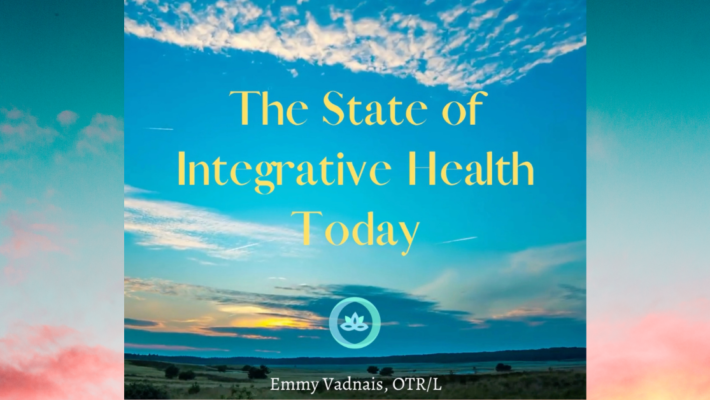
The State of Integrative Health Today
The state of integrative heath care is shared from my perspective––one that has evolved over 20 years through consistent study, practice, teaching, writing, and consulting––including supporting a whole profession of occupational therapists to embrace what may be known as holistic health or has formerly been known as complementary and alternative medicine.
For the sake of time, and the fact that I just completed writing my Intuitive Development book, that includes many researched and referenced integrative health approaches, I will be speaking from my heart and the aforementioned research that now flows through me like the blood in my vessels.
Meditation and Yoga are Mainstream
Why is that? Because of you, your family members, and your therapists are practicing it, research, and because they work in a lot of cases to lower stress, pain, anxiety, improve balance, enhance cognitive functioning, assist with emotional regulation, improve mood and quality of life, enhance functioning and ability to carry out daily tasks, and much more.
The research is there. These disciplines have been receiving a lot of research over the past 10 years that demonstrate powerful results in a lot of cases.

Chances are you or a loved one have practiced breath work that can induce the relaxation response. Breath work is used at the beginning of or a part of all forms of meditation and yoga. The relaxation response can lower blood pressure, heart rate, the stress-hormone cortisol, help us to move from the stress response of the fight, flight, or freeze to the rest and digest response where we are in a more homeostatic balance. Our heart rate variability increases which is correlated with better physical, mental, and emotional health that helps us to be more resilient.
People often feel better after practicing yoga and meditation. We can feel more peaceful. We can access our intuition more easily––the part of us this is our true inner knowing––beyond rational, judging, emotional, and analytical thought. This can help us to be more clear and make better choices and decisions.
People who participated in yoga, in addition to standard rehab, generally improved far more than with just the rehab alone (See Yoga Therapy for Stroke).
Meditation may be able to help prevent and recover from disease. When paired with a positive intention or expectation of belief that something positive will happen, a.k.a. the placebo response, people are able to with statistically significance to stay well and recover from diseases, such as cancer, cardiovascular disease, and Parkinson’s Disease.
More Healthcare Practitioners are Practicing Integrative Health
When I first began studying holistic health in the late 1990’s there were very few health care practitioners practicing these approaches. There were pockets of some small groups, but you had to dig to find them. Now, it’s the quite the opposite. A majority of healthcare practitioners are at least aware of, referring to, or are practicing integrative health.
The Holistic OT Community following has increased to almost 10,000 followers under 10 years. I am interacting with thousands of occupational therapists and other healthcare practitioners. I have trained over 1,000 healthcare practitioners in integrative health continuing education classes. I am contacted by hundreds of OTs each month interested in beginning or expanding their practice with integrative health. This is growing each year. Some days I feel I can barely keep up.
The Research Has Grown
The evidence is there. Will it work in every case? No. But neither do the medications or surgeries that are prescribed work every time. Herbert Benson, MD, who coined the term the relaxation response, found that most, 60-90%, doctors’ visits are in the mind-body stress-related realm poorly treated by drugs and surgeries (See Relaxation Revolution). This is where integrative health can shine. Because most of the approaches address the mind-body (and spirit!) connection in an excellent way. Sometimes, a combination of various approaches are needed for healing. Every person along with healthcare practitioners need to find what works for them. For everyone, that is largely modulated by their belief.
The Power of Belief
We now know that it is estimated that 80% of our health and wellness is up to us (See How Healing Works). It seems that what we believe to be true, in most cases will be true. It seems that the approach or intervention that we believe will help us, likely will.
This echoes what is sometimes referred to as the law of attraction or the law of correspondence. It’s probable that most, if not all of our thoughts and beliefs greatly impact our health and wellness.
Aromatherapy is a Household Name
When I first began my massage therapy classes and was the office manager of a holistic health and wellness center, it was more the exception that people had heard of or would use essential oils. In fact, that was predominantly the only place where people came in contact with essential oils, was during their massage.
Now, with the help of people of Jane Buckle, PhD, RN, there is a lot more evidence for the ways that essentials oils can be used for health, wellness, and in a clinical environment. It seems that most everyone who practices yoga or meditation has a diffuser, incense, or both.
This is for good reason. They smell good. Well, most of them, and it can also depend on your preference for the benefits of the mood-enhancing aromas. In addition, there is good evidence that it may help many types of infectious disease that don’t always respond to conventional treatments.
One hidden benefit of aromatherapy, that is under your nose (had to), is that it can help you take a more deep and full breath––that we know has many researched benefits.
Integrative Health Can Be Practiced as Self-Care
Many healthcare practitioners have and are experiencing the positive benefits of integrative health because it can be used as a form of self-care, in addition to treatments. Also, once a client or patient has been taught these approaches, they can often practice their new skills in between sessions. They often find it improves their lives. So, they continue practicing it. Relationships with yourself and others can improve. The root of the cause of many diseases may be based in a lack of self-love and self-acceptance.
Meaning and Purpose Grows
Most people describe that they are “on a journey” when incorporating integrative health into their lives. Many of the approaches help people to manage stress, pain, and assist with emotional regulation. When in a calmer state of mind people can find more meaning, purpose, insight, and understanding into their challenges. You can find more peace. When you experience more joy and peace, you may enhance your spirituality, religion, or beliefs. When you are connected to what many describe as something greater than yourself, you can experience a oneness, strengthen intuition for insight and direction, that is correlated with better health and wellness.
Integrative Health is Here to Stay
The approaches used with integrative health, wellness, and prevention have become a part of mainstream healthcare. Will there be a day that we no longer call it integrative? Probably.
There are many types of integrative health. If you would like to learn more check out my new book, Intuitive Development or take the class OT with Complementary Health Approaches and Integrative Health (CHAIH) that I created for the American Occupational Therapy Association (AOTA). Visit the FAQ and have a look around the blog on the HolisticOT.org website.





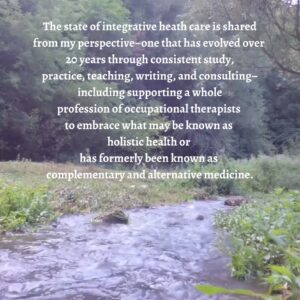
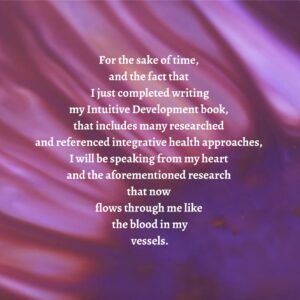
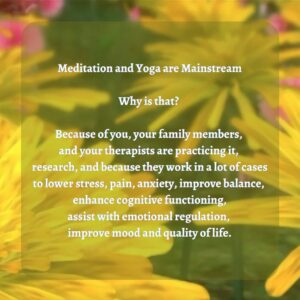
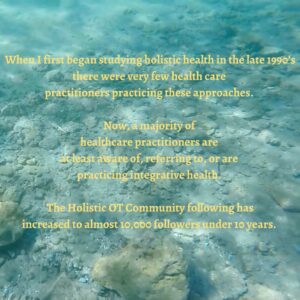
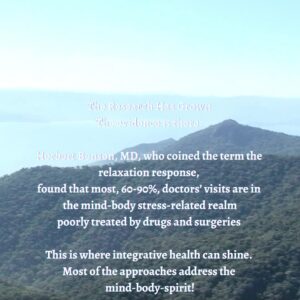
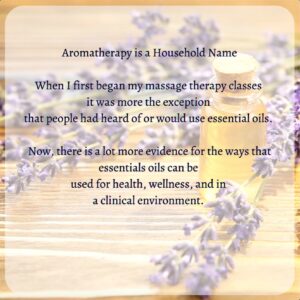
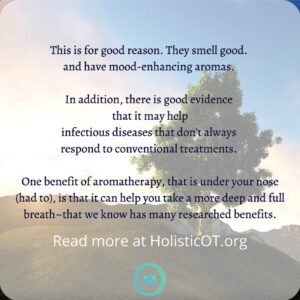
Leave a Reply